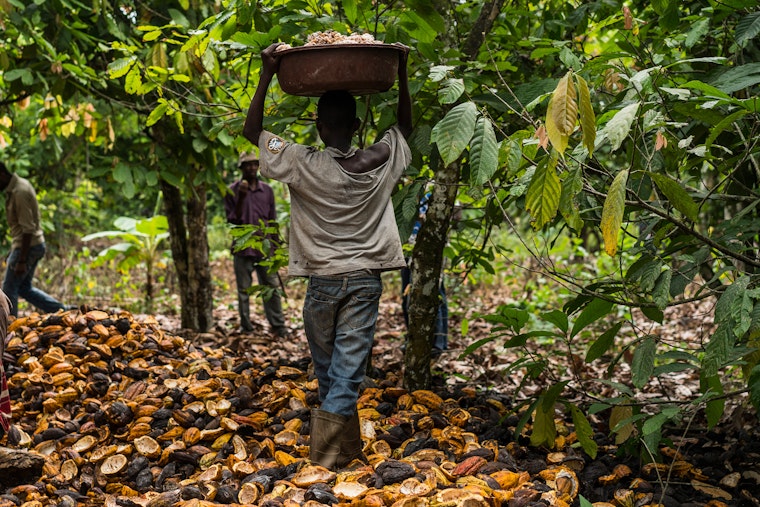How a 230-Year-Old Law Could Hold U.S. Corporations Accountable for Child Slavery Abroad
By Natasha Arnpriester & Azure Wheeler

Forty million people are enslaved around the world. One in four are children, many forced into work through trafficking and subjected to violence and other grave human rights violations. In Côte d'Ivoire and Ghana alone, over 1.5 million children labor on cocoa plantations, which together produce 60% of the world’s cocoa beans, a base ingredient used by multinational chocolate suppliers like Nestlé and Cargill.
Côte d'Ivoire produces the most cocoa of any country in the world, a majority of which is imported to the United States. While Nestlé and Cargill have long been aware of child slavery in their supply chains, they continue to exploit children in favor of fiscal profit. Despite the companies’ promises 20 years ago to eradicate the practice, child labor in Ivorian cocoa has only increased. Now, a case currently before the U.S. Supreme Court could decide whether children formerly held as slaves can hold U.S. corporations accountable for human rights violations perpetrated abroad.
In 2005, six children, enslaved and trafficked from the neighboring country of Mali, brought suit in U.S. federal court against Nestlé USA, the U.S. subsidiary of the world’s largest food producer, and in 2006 against Cargill, the largest privately held company in the U.S., for aiding and abetting the children’s enslavement on cocoa farms in Côte d'Ivoire. The children, ages 12-14, recounted horrific abuses, including physical beatings with whips and branches and threats of severe torture if they attempted to escape the farms—threats made real, as they recalled brutal punishment suffered by other children who tried to run away.
The children brought their claim in U.S. court under the 1789 Alien Tort Statute (ATS), a law as old as the Constitution. The ATS provides federal courts with jurisdiction to hear a civil suit brought by a foreign person for an act (i.e. tort) committed in violation of the “law of nations,” a term used centuries ago to describe international law. According to the U.S. Supreme Court, the law “was intended to promote harmony in international relations by ensuring foreign plaintiffs a remedy for international-law violations in circumstances where the absence of a remedy might provoke foreign nations to hold the United States accountable.”
The ATS stood relatively dormant until 1980, when family members of a young torture victim successfully brought an ATS case against one of his torturers, a former Paraguayan police official who had relocated to the U.S. The Second Circuit Court of Appeals found that “torture” is a clear violation of international law, thereby providing jurisdiction under the ATS to hear the case. The case set a precedent that empowered survivors of other human rights abuses under international law to avail themselves of U.S. courts in an effort to hold their victimizers to account—which includes multinational corporations that played a role in perpetrating such abuses.
Corporations reap huge financial benefits from modern-day slavery in their supply chains. The International Labor Organization found that the use of forced labor in the private economy brings in profits upwards of $150 billion (USD) per year. As such, corporations have waged a heavy-handed campaign in the courts to roll back ATS jurisdiction. In 2013, the U.S. Supreme Court handed corporations a colossal, and harmful, victory when it significantly restricted the exterritorial application of the ATS, holding that the statute does not extend to foreign corporations when “all the relevant conduct took place outside the United States.” It left unresolved the question of whether foreign corporations may be sued under the ATS.
In 2018, the Supreme Court resolved that question in favor of corporations—striking another blow to the ATS. Some 6,000 foreign nationals sought damages from the Arab Bank for deaths and injuries suffered in largely Middle East-based terrorist attacks allegedly financed by the Jordanian financial institution. The Supreme Court’s ruling fully eliminated ATS jurisdiction over foreign corporations, but left open the question whether the ATS applies to domestic ones. The case against Nestlé USA and Cargill is set to answer this question.
Other nations regularly hold their own corporations accountable for international law violations. Countries such as Australia, Germany, and England routinely assert jurisdiction over their corporations, regardless of where they operate. Canada’s Supreme Court recently affirmed that Canadian corporations can be sued in domestic courts for complicity in human rights violations committed abroad. Should the U.S. Supreme Court eviscerate the ATS as a tool for domestic corporate accountability, the U.S. would become an outlier amongst its global partners, creating a significant gap in human rights accountability given the dominance of U.S. corporations in the global market.
This possibility prompted 21 bipartisan members of Congress to submit an amicus brief to the Supreme Court in Nestlé USA and Cargill v. Doe affirming that, “United States courts are an appropriate forum to hear claims that United States citizens, whether individuals or corporations, have aided and abetted child slavery. Such conduct is no less horrendous and no less deserving of redress when the enslaved children are forced to labor outside our shores.”
This case presents one of the last available avenues for rights survivors under the ATS, and the outcome could potentially immunize U.S. corporations for human rights violations in their global supply chains. Without an accessible judicial remedy, abuses will continue. Publicly exposing these violations alone—such as these children have tried to do in their lawsuit—is sadly not enough to eliminate such abuses.
A decision in this case is unlikely to come before the spring, but whether evaluated legally, historically, comparatively or morally, the answer is clear: the U.S. should not be a safe harbor for its own corporations to exploit and abuse foreign persons with impunity—especially on the backs of enslaved children.
Natasha Arnpriester is an advocacy officer with Open Society Justice Initiative.
Azure Wheeler is an associate legal officer with Open Society Justice Initiative.